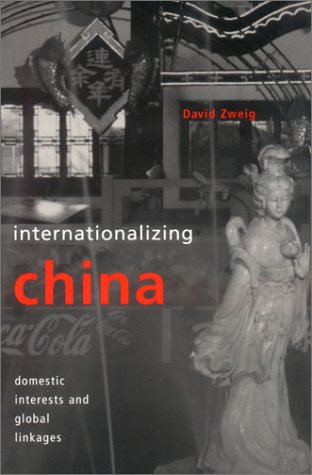Internationalizing China: domestic interests and global linkages / David Zwieg
About the book
 [From Library Journal]
[From Library Journal]
This book provides excellent documentation and analysis of how China developed markets for several types of products within four main sectors: its urban centers, its rural regions, its educational institutions, and various international development assistance organizations (e.g., the United Nations Development Bank, or UNDP). These four sectors represent the overall focus of what Zwieg defines as internationalization, "the expanded flow of goods, services, and people across state boundaries, thereby increasing the share of transnational exchanges relative to domestic ones, along with a decline in regulating those flows." Having studied the Chinese political economy for at least a decade, Zweig offers several dynamic hypotheses to determine, for example, how the attitudes of Chinese bureaucrats changed from being highly resistant to supporting these transnational exchanges. He notes that China's future depends on the extent to which corruption, which can disrupt development tremendously, can be controlled by government policies. This thorough analysis is especially useful for scholars in comparative politics and international relations.
[Peggy Spitzer Christoff, Library of Congress]
Speaker:
Mr Frank Ching 秦家驄
Moderator:
Professor J P Burns
Department of Politics and Public Administration
Language: English
Date: Thursday, 7 November 2002
Time: 7:15 - 9:00 pm
Venue: Main Library
About the Speaker
Frank Ching received a bachelor's degree in English from Fordham University, a master's degree in philosophy from New York University and a Certificate in Advanced International Reporting from Columbia University as a Ford Foundation Fellow.
He is a journalist who has reported and commented on events in Asia, particularly China, for several decades. He worked for The New York Times, The Wall Street Journal and the Far Eastern Economic Review, another Dow Jones publication. He opened The Wall Street Journal's bureau in China in 1979, after the normalization of U.S.-China relations, thus becoming one of the first four American newspaper reporters to be based in Beijing since 1949.
After leaving Beijing, Mr. Ching spent several years working on a book, "ANCESTORS: 900 Years in the Life of a Chinese Family," (Morrow, N.Y. 1988). Using his own family as a vehicle, he presented a history of China from the Sung dynasty to the present. He belongs to a small handful of prominent families that can trace their origin in China for more than 30 generations.
In 1992, he joined the Far Eastern Economic Review. Until spring 2001, he wrote a weekly column, "Eye On Asia," in FEER in which he commented on political developments around the region, in particular China. He left the Review in 2001 and now writes a weekly column on China, which is syndicated across Asia as well as in North America.
For the last eight years, Mr. Ching has also hosted a weekly current affairs TV program in Hong Kong, "Newsline," which appears every Sunday evening on ATV World.
He has given speeches across the United States, including delivering the Inaugural Lecture of the Ravenholt-Severyns Lecture at the University of Washington and the inaugural lunch speaker at the annual Chiefs of Defense Mission sponsored by the Commander in Chief, Pacific, in Honolulu. Aside from "ANCESTORS," he is the author of several other books, including "Hong Kong and China: For Better or For Worse," published jointly by the Asia Society and the Foreign Policy Association in New York and, more recently, "The Li Dynasty: Hong Kong Aristocrats," published by Oxford University Press. His articles have appeared in Foreign Affairs, Foreign Policy, World Policy Journal, China Quarterly, the Washington Quarterly, and other publications.

